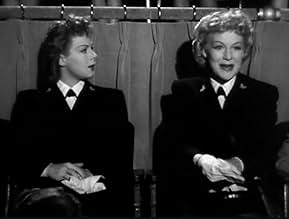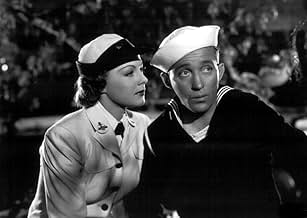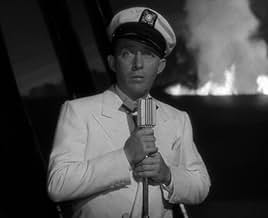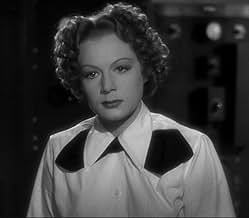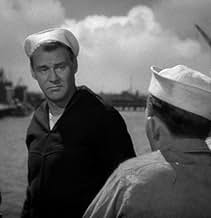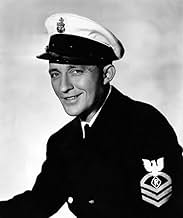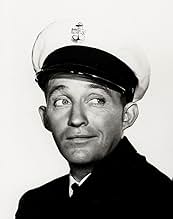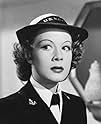AVALIAÇÃO DA IMDb
6,1/10
507
SUA AVALIAÇÃO
Adicionar um enredo no seu idiomaShow business twin sisters Rosemary and Susie, one serious and the other a scatterbrain, join the WAVES and both fall in love with crooner Johnny Cabot.Show business twin sisters Rosemary and Susie, one serious and the other a scatterbrain, join the WAVES and both fall in love with crooner Johnny Cabot.Show business twin sisters Rosemary and Susie, one serious and the other a scatterbrain, join the WAVES and both fall in love with crooner Johnny Cabot.
- Direção
- Roteiristas
- Artistas
- Indicado a 1 Oscar
- 1 indicação no total
Anabel Shaw
- Isabel
- (as Marjorie Henshaw)
Terry Adams
- Wave
- (não creditado)
Harry Barris
- Bandleader
- (não creditado)
Carmella Bergstrom
- Wave
- (não creditado)
Lillian Bronson
- Johnny Cabot Fan
- (não creditado)
Charles D. Brown
- Capt. Johnson
- (não creditado)
Mae Clarke
- Ens. Kirk
- (não creditado)
Carmen Clifford
- Bit Part
- (não creditado)
Yvonne De Carlo
- Wave
- (não creditado)
Evelyn Dockson
- Undetermined Role
- (não creditado)
Mimi Doyle
- Johnny Cabot Fan
- (não creditado)
- Direção
- Roteiristas
- Elenco e equipe completos
- Produção, bilheteria e muito mais no IMDbPro
Avaliações em destaque
A previous reviewer remarked that part of the plot involved Bing Crosby memorizing color tests to mask his color blindness to get in the Navy. In point of fact Bing was actually color blind. During the 1930s and 1940s it was not uncommon to see him photographed in a lot of loud and mismatched apparel which was a source of fodder for Bob Hope's monologues. The reason was he couldn't pick out matching stuff for his wardrobe.
Harold Arlen and Johnny Mercer wrote a great score for Bing and Betty Hutton to vocalize. Hutton manages to take her manic energy down a notch in the duet I'll Promise You with Bing. But Betty goes full blast on There's A Fella Waiting in Poughkeepsie. Bing has a nice solo ballad in Let's Take The Long Way Home.
The hit song of the movie was one of Bing's biggest Ac-cent-chu-ate the Positive. Johnny Mercer wrote that Bing was an instant study, he could hear a tune once and get it. He knew without being told where to come in on the downbeat. But you had to record him that first time if you wanted your version of the song. After that he started with the ad-libs his recordings are famous for.
The plot is easy to take and it allowed Crosby to satirize his up and coming rival Frank Sinatra. Too bad he never commercially recorded That Old Black Magic which was reprised for this film.
Harold Arlen and Johnny Mercer wrote a great score for Bing and Betty Hutton to vocalize. Hutton manages to take her manic energy down a notch in the duet I'll Promise You with Bing. But Betty goes full blast on There's A Fella Waiting in Poughkeepsie. Bing has a nice solo ballad in Let's Take The Long Way Home.
The hit song of the movie was one of Bing's biggest Ac-cent-chu-ate the Positive. Johnny Mercer wrote that Bing was an instant study, he could hear a tune once and get it. He knew without being told where to come in on the downbeat. But you had to record him that first time if you wanted your version of the song. After that he started with the ad-libs his recordings are famous for.
The plot is easy to take and it allowed Crosby to satirize his up and coming rival Frank Sinatra. Too bad he never commercially recorded That Old Black Magic which was reprised for this film.
This film should have worked. great Mercer score, Bing Crosby songs and Mark Sandrich directing.. but along comes Hutton to spoil the show.
Screeming like a demented banshee for much of the film, Hutton spoils what merit there is in the somewhat thin plot. Basically a flag waver along the lines of the earlier Crosby film "Star Spangled Rhythm" where Hutton also ruined the stirring Crosby number "Old Glory" again with her ear shattering screems, this film fails because someone failed to put prosac into Hutton's tea. If you can put up with Hutton then this makes for average rainy afternoon viewing. Bing deserved a better co-star than this and there were plenty around in 1944.
Screeming like a demented banshee for much of the film, Hutton spoils what merit there is in the somewhat thin plot. Basically a flag waver along the lines of the earlier Crosby film "Star Spangled Rhythm" where Hutton also ruined the stirring Crosby number "Old Glory" again with her ear shattering screems, this film fails because someone failed to put prosac into Hutton's tea. If you can put up with Hutton then this makes for average rainy afternoon viewing. Bing deserved a better co-star than this and there were plenty around in 1944.
"Here Come the Waves" is an entertaining film -- mostly for its musical numbers. By the mid-1940s, Bing Crosby had been a long- established singer and movie star. The film is a late entry in wartime movies that might be considered recruitment films for the U.S. war effort. But it's interesting and something of a curiosity as well. It's a light comedy romance that also seems to be something of a spoof. All of Crosby's tunes here are very slow love songs. And, in the early scenes of swooning women in the audience, Johnny Cabot (Crosby) exaggerates his crooning hilariously.
Betty Hutton is OK but not exceptional in her double role as twin sisters Susan and Rosemary Allison, and Sonny Tufts is OK as Johnny's friend, Windy Windhurst. The comedy is so-so, and the script is just mediocre.
Audiences today may not be that familiar with the Waves. In its plural reference, it was the WW II women's branch of the U.S. Navy. The acronym stood for Women Accepted for Volunteer Emergency Service." But this movie isn't as much about the Waves as it is about a star singer who flees the adulation of screaming fans to become part of a romantic triangle. Another film, "In the Navy," was made in early 1941, and is a much better portrayal of a star fleeing his fans. That Abbott and Costello film, with Dick Powell, has much more humor and dwells much more on the star escaping his adoring public. Both of these films are early portrayals of the mob hysteria of idol worshippers.
In the 1941 film, the mobs are usually the screaming teenage girls that were common to films in the later rock and roll age. But in this 1944 film, the adulation – if not the hysterics, includes young women and some into middle age.
Modern audiences that watch rock and roll era movies may think of that time as the birth of idol worship. Films of the late 1950s and into the 1960s had scenes of crazed idol worshipers. The hordes of mostly teenage girls were "madly in love" with a male singer. Hollywood made many such films, so it's no wonder people today might think that was when idol worship in the entertainment field began. But its start was much earlier.
Fan clubs of stars sprang up within a short time after the inventions that brought entertainment to the public on a large scale. Thomas Edison's phonograph of 1877 led the way, and the inventions of radio and moving pictures in the early 20th century ushered in more fan clubs of the big stars. But few movies made in the early decades showed the clubs. None had them as screaming, crazed idol worshipers. That became a trademark of the rock and roll films.
Yet, as these early films show, frenzied idol worship was a reality early in the 20th century. It was here well before the bobby soxer generation of the 1940s and early 1950s that preceded the age of rock and roll. Rudy Vallee was one of the 1930s crooners who had a big following of boisterous females. And Frank Sinatra had a huge following of crazed fans as the top pop singer of the mid-1940s. But Elvis Presley became the king of mob idol hysteria as well as king of rock and roll in the mid-1950s. With a number of contemporary stars around Presley, it's little wonder that that period should have so many films – mostly musical romances, that would show the hysterics in the worship of entertainment idols.
Betty Hutton is OK but not exceptional in her double role as twin sisters Susan and Rosemary Allison, and Sonny Tufts is OK as Johnny's friend, Windy Windhurst. The comedy is so-so, and the script is just mediocre.
Audiences today may not be that familiar with the Waves. In its plural reference, it was the WW II women's branch of the U.S. Navy. The acronym stood for Women Accepted for Volunteer Emergency Service." But this movie isn't as much about the Waves as it is about a star singer who flees the adulation of screaming fans to become part of a romantic triangle. Another film, "In the Navy," was made in early 1941, and is a much better portrayal of a star fleeing his fans. That Abbott and Costello film, with Dick Powell, has much more humor and dwells much more on the star escaping his adoring public. Both of these films are early portrayals of the mob hysteria of idol worshippers.
In the 1941 film, the mobs are usually the screaming teenage girls that were common to films in the later rock and roll age. But in this 1944 film, the adulation – if not the hysterics, includes young women and some into middle age.
Modern audiences that watch rock and roll era movies may think of that time as the birth of idol worship. Films of the late 1950s and into the 1960s had scenes of crazed idol worshipers. The hordes of mostly teenage girls were "madly in love" with a male singer. Hollywood made many such films, so it's no wonder people today might think that was when idol worship in the entertainment field began. But its start was much earlier.
Fan clubs of stars sprang up within a short time after the inventions that brought entertainment to the public on a large scale. Thomas Edison's phonograph of 1877 led the way, and the inventions of radio and moving pictures in the early 20th century ushered in more fan clubs of the big stars. But few movies made in the early decades showed the clubs. None had them as screaming, crazed idol worshipers. That became a trademark of the rock and roll films.
Yet, as these early films show, frenzied idol worship was a reality early in the 20th century. It was here well before the bobby soxer generation of the 1940s and early 1950s that preceded the age of rock and roll. Rudy Vallee was one of the 1930s crooners who had a big following of boisterous females. And Frank Sinatra had a huge following of crazed fans as the top pop singer of the mid-1940s. But Elvis Presley became the king of mob idol hysteria as well as king of rock and roll in the mid-1950s. With a number of contemporary stars around Presley, it's little wonder that that period should have so many films – mostly musical romances, that would show the hysterics in the worship of entertainment idols.
Bing Crosby stars in this paper-thin musical comedy which doubles as an all-out flag waving morale-builder for the war effort. Although it boasts a noteworthy Johnny Mercer score, and Crosby's buoyant personality, `Here Come the Waves' is marred by extreme predictability and a glaringly overexuberant turn by Betty Hutton.
Crosby stars as a popular singer and bobbysoxers' idol, in a quasi-parody of Sinatra or even Crosby himself. Despite his colorblindness, he enlists in the navy and becomes romantically involved with a pair of WAVES who happen to be twin sisters (both played by Hutton). This leads to the usual complications, schemes, mistaken identities, one-upmanship, hurt feelings, and reconciliations. Along the way, Crosby and the WAVES put on a gala production for the servicemen, which climaxes in a show stopping performance of `Accentuate the Positive.'
Crosby brings his routine charisma to the role, which fits him like a glove. He gets to croon several other memorable songs, including `That Old Black Magic' and `Let's Take the Long Way Home.' But Hutton throws herself completely into her role(s), and comes off as far too bubbly and high-strung. Whether she honestly felt that the part called for so much pep or if perhaps she was trying her best to steal scenes from Crosby I do not know, but regardless of her motivations it is just too much, as director Mark Sandrich should have realized and immediately corrected. I grant that in a movie like this the plot is of minimal importance and exists merely to hold the tunes together, but this premise is tired and stale, and all the plot twists can be predicted from a mile away. It's unabashedly patriotic and perfectly harmless enough as entertainment, but there's honestly nothing new here.
Crosby stars as a popular singer and bobbysoxers' idol, in a quasi-parody of Sinatra or even Crosby himself. Despite his colorblindness, he enlists in the navy and becomes romantically involved with a pair of WAVES who happen to be twin sisters (both played by Hutton). This leads to the usual complications, schemes, mistaken identities, one-upmanship, hurt feelings, and reconciliations. Along the way, Crosby and the WAVES put on a gala production for the servicemen, which climaxes in a show stopping performance of `Accentuate the Positive.'
Crosby brings his routine charisma to the role, which fits him like a glove. He gets to croon several other memorable songs, including `That Old Black Magic' and `Let's Take the Long Way Home.' But Hutton throws herself completely into her role(s), and comes off as far too bubbly and high-strung. Whether she honestly felt that the part called for so much pep or if perhaps she was trying her best to steal scenes from Crosby I do not know, but regardless of her motivations it is just too much, as director Mark Sandrich should have realized and immediately corrected. I grant that in a movie like this the plot is of minimal importance and exists merely to hold the tunes together, but this premise is tired and stale, and all the plot twists can be predicted from a mile away. It's unabashedly patriotic and perfectly harmless enough as entertainment, but there's honestly nothing new here.
My late aunt, Kathleen C. Quinn, was the technical advisor for "Here Come the Waves". She was a Lieutenant(jg) in the WAVES and was assigned to the movie. She said that the most difficult part of her job was in getting both the studio and the female cast, including Betty Hutton, to keep the hair styles within WAVE regulation length. (Regulation length was much shorter than the popular styles of the time.) She always told us that both Bing and Betty were very easy to work with.
Você sabia?
- CuriosidadesOne of over 700 Paramount Productions, filmed between 1929 and 1949, which were sold to MCA/Universal in 1958 for television distribution, and have been owned and controlled by Universal ever since; its earliest documented telecast took place in Seattle Thursday 23 October 1958 on KIRO (Channel 7); it first aired in Phoenix Wednesday 19 August 1959 on KVAR (Channel 12); it was released on DVD 14 November 2006 as one of 5 titles in Universal's Bing Crosby Screen Legend Collection, and again 11 November 2014 as one of 24 titles in Universal's Bing Crosby Silver Screen Collection.
- Erros de gravaçãoWhen Betty Hutton begins to write a letter, she is shown in medium shot and she is obviously just scribbling on the paper, but after the cut to an over-the-shoulder shot, the writing does not match and it is neat and legible.
- ConexõesFeatured in How Hollywood Twins Scenes Have Evolved Over 100 Years (2021)
Principais escolhas
Faça login para avaliar e ver a lista de recomendações personalizadas
Detalhes
- Data de lançamento
- País de origem
- Idioma
- Também conhecido como
- Here Come the Waves
- Locações de filme
- Empresa de produção
- Consulte mais créditos da empresa na IMDbPro
- Tempo de duração
- 1 h 39 min(99 min)
- Cor
- Proporção
- 1.37 : 1
Contribua para esta página
Sugerir uma alteração ou adicionar conteúdo ausente

